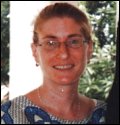Erika Seid, an American psychotherapist, spent ten months (March 2004 to January 2005) working with Doctors Without Borders/Médecins Sans Frontières (MSF) to establish mental health services clinic in Kinkala, a town of six to ten thousand people, in the Pool region of the Republic of Congo. For over ten years, the region was at the center of a series of bloody civil wars between opposing government and rebel forces. Having witnessed helicopter gunship massacres and the looting and burning of their homes, as well as seeing family members tortured, raped, and murdered, many Kinkalans are traumatized and unsure of how to deal with these painful memories. MSF provides some of the very limited psychosocial support in the Republic of Congo, and Kinkala's new general counseling center is one of the few of its kind in the country. The following is based on excerpts from Seid's journal and interviews with MSF.
|
Building a Common Language
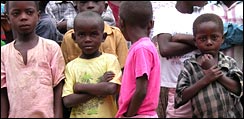
©Erika Seid |
Culturally speaking, people express fear and stress very differently in the Republic of Congo than in the West. If I saw a group of Americans who were really depressed, I could tell. But in Kinkala, though fear and stress are at extremely high levels, the vast majority of people have a generally quiet, slow, smiling, and peaceful manner and it is often easy to mistake them for relaxed and happy. The area looks like a sleepy jungle paradise. An outsider would never know that not so long ago Pool was a frightening, bloody place: corpses everywhere, people starving, living in the forest for months at a time. Not to mention the frequent rapes, torture, and hostage taking of women, men, children, and elderly people. Yet, had I not known this was a post-conflict zone, I wouldn't have realized I was among people who had been traumatized.
So in spite of my experience as a psychotherapist in California, I had a hard time reading people's emotions. Clearly, I was not going to be able to do effective outreach without speaking Kinkala's common language, far beyond mere words. I needed to develop a mental health treatment appropriate for the Congolese culture, which would allow local people to get actively involved. This way, when MSF eventually leaves, people will have more resources to help them with the healing process. So in April 2004, I began recruiting local counselors and social workers to train on basic therapeutic techniques, and help me bridge the cultural divide.
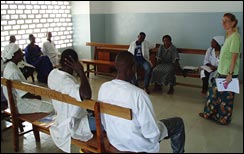
Erika facilitating a training session for hospital staff. ©Erika Seid |
I had never encountered such enthusiastic and dedicated participants in a training program. The two counselors, Marie-Blaise Nkouka-Diafouka, and Ghislain-Ulrich Pangou, as well as Ernestine Stanislas Ndala, the community facilitator, excelled in our training program. They eventually took on the vast majority of work directly with clients. My job was to train, provide clinical supervision and emotional support, while those three were the real feet, ears, and hearts on the ground.
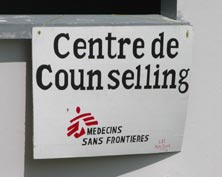
©Erika Seid |
Setting Up the Counseling Center
I cannot overstate the significance of Christianity for people in Pool and as the only existing outlet for their trauma. Religious leaders are the main people in the community who have always done the work of listening to traumatic stories.
Taking this into account and seeing it as an opportunity to get to know the community better, I began attending Sunday services at various churches. As a result, almost everyone in town got to know me by name and heard at least a little about our program and the services it offers, before the counseling center officially opened.
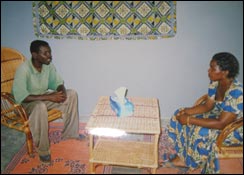
Marie-Blaise Nkouka-Diafouka, Psychosocial counselor, providing individual counseling to a male client. © Erika Seid |
Because there is no history of, or familiarity with, Western mental health care, most Kinkalans did not associate shame with seeking counseling (the exception to this is rape, which people are very reluctant to discuss). Talking with a counselor about a problem makes sense to people, because it is expected that whenever you have a problem of any kind you will always go to someone else for help. The difference in this case was that people did not know that their reactions to war and violence were the kind of problems someone could help with. Once they made the connection, they were willing to try.
While Kinkalans were comfortable telling our counselors their stories, they were concerned, understandably, with having the rest of the community find out what they'd said. One of the first things I did in setting up the counseling center was to create a bilingual (French-Laari) set of posters. One poster was a confidentiality statement, explaining that whatever patients told us would be kept in strict confidence, and the other explaining that group discussions were to be kept private between participants. I also purchased a small radio to muffle sounds across the counseling rooms.
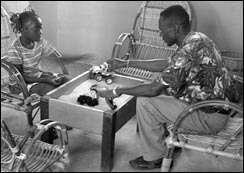
Ghislain-Ulrich Pangou doing play therapy with a child at the Kinkala counseling Center ©Erika Seid |
Confidentiality is a moot point, however, if a patient can't find words to describe their experiences. This was the case for children in Kinkala, most of whom had witnessed brutal acts of violence. With this in mind, I had a sandbox built in the counseling center for children. The sandbox is a tool often used by psychologists in the United States to help children express their emotions through toys and play. In the case of Kinkala, we had for example, some toy helicopters in the sandbox. Many of the children had seen helicopter gunship attacks take place and this toy allowed the children to act out some of their experiences.
With all of these things in place, we held an inauguration ceremony with about 85 attendees from the community. We introduced them to our psychosocial team, gave them a guided tour of the counseling center, and allowed them to ask questions about traumatism and the counseling process. All participants were encouraged to refer potential patients to the center. This was important as throughout my time in Kinkala, referrals were our primary source of patients, whether it was through doctors and nurses in the local MSF-supported hospital, local community leaders, such as teachers and pastors, or through former patients who felt better after treatment and told their friends it was worth a visit.
The counseling center opened for business on June 29. Our only patient on that first day was a young man who had tried to commit suicide. By November, we had an impressive increase in patients served. We saw a total of 92 people in the counseling center, 77 of whom were new patients. We counseled about 300 people in the first five months of operation.
We had one female patient who was a mother of two in her late 20s. She had fled the capital Brazzaville with her family during the war of 1998. During the escape, she witnessed rebels murder her brother-in-law and abduct her husband, who was also shot and killed soon thereafter. For the next six years, prior to finding our counseling center in Kinkala, she suffered from insomnia and debilitating, panic-induced stomach cramps. She felt lonely and isolated, completely removed from the world. Though she said she had a good memory prior to the deaths of her family members and had done well in school, she now had trouble retaining even basic information and was very frustrated. We taught her basic breathing exercises and relaxation techniques. She told us that these helped her sleep, manage the pain and helped her keep from feeling completely overwhelmed by problems. She said, "I never thought that I would feel like a human being again."
Reaching People through Mobile Clinics
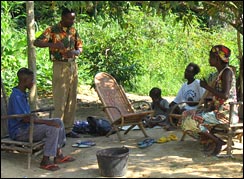
Ghislain-Ulrich Pangou, psychological counselor, teaching some Kinkala residents basic deep breathing techniques to help them manage pain, insomnia and panic attacks. ©Erika Seid |
Most people in Kinkala work in their agricultural fields during the day, and the team decided to conduct home visits to reach more people in the community. After conducting a home-visit campaign to better understand the needs of the community, Ernestine began going door-to-door in different neighborhoods of Kinkala, and she stopped in wherever she found people. They brought out chairs and gathered in the front yard while she talked to them about traumatism, the causes, and some ways people can cope, like by doing deep breathing exercises. Inevitably, this gathering became a time where people shared their stories and some of the horrors they had endured.
We rarely found anyone that didn't have a traumatic war story. They often said that whenever they heard the sound of helicopters or gunshots (not all that uncommon as there is a large military base in town) they had an automatic panic response: pounding heart, falling down on the floor, crying, and, something I had not previously encountered, spontaneous diarrhea.
During one home visit, we met a grandmother who pointed out her 7-year-old grandson. All of the other family was dead and she was the only remaining person caring for him. She talked about how much he was suffering and brought him to the counseling center the very next morning, before we even opened the doors at 9:00. During the first session, the counselor interviewed the grandmother to find out some history, while the boy was occupied with a paper and crayon. He drew the same shape over and over, intensely focusing, for more than one and a half hours, never talking or interacting at all with the counselor. Clearly, he was getting something out. Then he came back by himself the next morning (about a 40 minute walk).
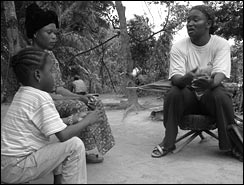
Ernestine Stanislas Ndala, MSF social Worker, visiting a family at their home to talk about traumatism, and letting them know about our services available at the Kinkala Hospital Counseling Center. © Erika Seid |
We didn't keep formal statistics our home visits, but I think we can safely say that when those people are included we had probably served somewhere in the vicinity of 600 to 800 people by November.
Reaching Young People
There were a high number of young adults who told us they had trouble getting on with their lives in the aftermath of the civil war. They just couldn't seem to find a way to support themselves economically, they couldn't get motivated to continue their studies, they weren't marrying or developing their families as they felt they should, they had a fear of starting over because of the risk that they would lose everything again.
One local resident, was once a nationally renowned karate master. He told me that before the war he gave classes all over the place and was often called to Brazzaville to teach and give demonstrations. Now he teaches here in Kinkala, but only outside in the open air. Because he is trained to kill, if he teaches in a closed space, the government may accuse him of training rebels. During the war years, many of his students fled into the forest, fearing capture and torture by the military for their martial arts activities. Some have come back, but many are still afraid to be in any way linked to karate. So even the most basic extra-curricular activities, and ways of relieving stress for young people, have suffered.
Keeping such things in mind, I decided we needed to get our services much more directly out to young people. We developed a campaign going around to the different neighborhoods doing targeted presentations on the experiences of young people with traumatism. We planned a program to counsel and train teachers throughout the school district, to help them cope with their own traumatic experiences and those of their students. Once they have a bit of grounding, we would be able to go into classrooms regularly and work directly with children.
On our first visit to a Kinkala school, Ernestine, Marie-Blaise, and I did not really know what to expect, and this was a bit of a test that we would use to develop our more general plan for working in the schools. What we found was very intense, and it was a difficult morning for all three of us. We saw about 40 children aged approximately 10 to 12 years old, in groups of 10 at a time for about 45 minutes each. Of the 40, probably 15 or 20 told terrifying stories, most of which included the murder of at least a mother, father, uncle or sibling, if not several of those people.
Support Group for Pregnant Women
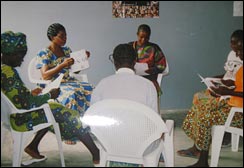
Marie-Blaise Nkouka-Diafouka facilitating a counseling group for pregnant women. ©Erika Seid |
By the time I arrived in Kinkala, the region had stabilized and shelter, food, and medical care were once again available. Basic survival was no longer such a pressing issue, so children shouldn't really have been going hungry. Thus, when a malnourished child arrived at the hospital, this was often a red flag for neglect and resulted in a referral to our counseling services.
Women struggling to cope with their own problems, such as having been raped or suffering other traumas, can find caring for a baby overwhelming. We counseled one woman who lost 17 members of her family between the 1998 and 2002 wars here in Pool. It's hard to imagine what that means to someone in a culture where family is absolutely everything in a person's life. And, often, when someone dies, people have the double stress of having to deal not only with the loss of the person, but also not being able to afford to build a proper grave. This is expensive, and people take years in these poor economic times to save up enough money to do what they need to do. Whoever is the head of the family has the responsibility for making sure this happens, and until the grave is finished, the person cannot feel at ease or complete their grieving process.
Then you had stories like the woman who came to see us after a long history of suicide attempts following a gang rape by soldiers that invaded her village six years ago. It's no wonder that women traumatized by such events often have a difficult time caring for their children, whether it's holding them, playing with them, or even feeding them. To address these issues, we developed art activity groups for traumatized pregnant women to facilitate bonding between mother and child before the baby is born.
International Mental Health Day
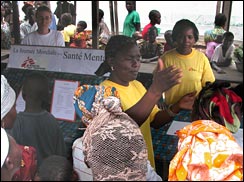
Ernestine and Marie-Blaise talking to crowds at the Kinkala Market on International Mental Health Day. ©Erika Seid |
In October, the team decided to use International Mental Health Day to promote more awareness of the counseling center and traumatism. At the market in Kinkala, we set up a table at the entrance with pictures of the counseling center, posters explaining the causes and symptoms of traumatism and the benefits of counseling, and a special game. People came by, heard a little presentation about our work and the materials that we had brought. Then they were offered a chance to pull a question out of a hat. The questions: What are some symptoms of traumatism? Where do people go for treatment when they suffer the after effects of the war?
The game was immensely popular, and by the end of the day we'd had about 300 quality visits to our exhibit. We got quite a lot of new patients as a result, so the team decided they wanted to repeat the activity on a more regular basis. We agreed that we would do it approximately once every month on market day and people still come in from far and wide.
Departing Kinkala
When it was time for me to leave Kinkala in January, I was touched that clients that I had worked with individually came to me to tell me that they had not had any hope of ever recovering their former selves, and they were deeply grateful that after our work together they were each amazed to find that they felt like a human being again for the first time since before the wars. Another client, who had come with a problem that he was frequently and easily angered, told me that since our last session about a month ago, he had so mastered the deep breathing and relaxation techniques I'd taught him that he'd only gotten angry once. This was down from more than once a day, and he could not have been more satisfied.

